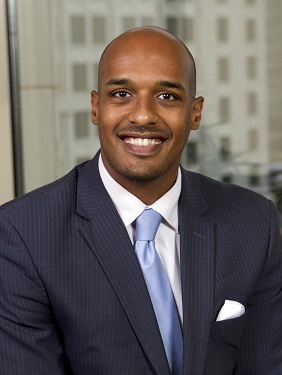This month’s professional spotlight features Pete Temesgen, medical malpractice and criminal defense attorney. Read more about Pete’s impressive journey, his work, and his service to his community.
Could you briefly explain some of your responsibilities in your current career role?
As an attorney at Huff Powell Bailey LLC, I mostly defend healthcare providers, physicians, nurses, and hospitals in medical malpractice lawsuits. I may also assist our products liability team from time to time. I have also started representing criminal defendants in federal court, which has been really rewarding. My responsibilities involve drafting briefs, preparing expert witnesses, and litigating in the courtroom.
Before assuming your current role, you were an Assistant District Attorney, what was that experience like? Can you briefly describe some of the impactful cases you worked on that time?
I spent a good amount of time in trial, prosecuting property crimes at first and then serious violent crimes. Murder trials were extremely emotional, naturally, for the families. I recall one trial in particular in which the victim was an innocent cab driver, supporting his wife and daughters, and was murdered at point blank range with no explanation by a late-night customer. I marshaled the facts in such a way that I felt confident that we would see a guilty verdict for the perpetrator, but there is never certainty about what a jury will do once they are in deliberation. By that point in the trial, the family of the victim had been present every day and my heart was aching for them. They wanted justice. When the jury returned a guilty verdict, their sobs of relief and words of gratitude were very touching to me.
I also tried a very complex RICO case, in which a family of four – including the matriarch – was charged with trafficking in cocaine, kidnapping, armed bank robbery, and murder. Let’s just say the facts of that case may inspire a movie in the future! In another case, I prosecuted three members of the Crip street gang for the broad-day murder of a rival. That case was noteworthy because the large, public mall in town was the scene of the murder!
Outside of the law, what are some other ways you practice civic engagement?
My wife is a playwright, so the arts are very important to both of us. I serve on the Executive Board of the Springer Opera House, Georgia’s Historic State Theatre. I am also currently the President of the Fountain City Bar Association, the historically-black bar in Columbus, Georgia. We sponsor pre-law camps and workshops for students in the community, and host fundraisers for local missions that uplift young boys and girls of color. I am also an adjunct faculty member of Criminal Justice at Columbus State University.
How did you come to decide that this was the right career path for you?
I have always been interested in government and international relations since I came to this county from Eritrea in 1995. As an undergraduate at Princeton, I majored in Public and International Affairs. Some of my peers took that as a launch-pad to work abroad in NGOs or go into the political scene, while others of us turned to law. While in law school, my understanding of how and where I might like to practice broadened greatly. I realized that there were many areas in which my interests could flourish as an attorney.
What are some other leadership, community roles that you’ve taken on?
Besides what I’ve mentioned earlier, I serve as an Elder at my church, Grace Presbyterian. I am also in the 2019 class of Leadership Georgia, one of the oldest and most-emulated leadership programs in the country. At Leadership Georgia, state-wide business, civic, and community leaders converge to strengthen and unify our state.
Is there a philosophy that drives your career?
Someone I respect shared his philosophy with me some years back and I’ve adopted it as my own. He said that he strived to always get better on the three A’s: affability, availability, and ability. According to him, the least important of the three was ability! I took that and ran with it. My own philosophy centers on being accessible to those I serve and work for, being pleasant and kind under any circumstance, and doing good work (that is always improving)!
What do you consider to be your greatest professional accomplishment?
I hope my greatest accomplishments are in front of me. But the most meaningful professional accomplishment to date is also one of my earliest. As a third-year law student at Boston University, I participated in an immigration clinic where we actively worked with established immigration attorneys to help people in affirmative or defensive proceedings in immigration court. I will carry one case with me, probably for the rest of my life. A man from central Africa – we can call him “T” – had been struggling for years to get asylum, but was seen by many attorneys who had represented him as troublesome and difficult. T had a history of extreme persecution from both sides of the political factions in his country. He was forcibly conscripted into the militia forces as a “child soldier.” Almost his entire family was murdered. He himself was arrested, detained, and brutally tortured. His history of persecution, and serious medical problems relating to what he suffered, made it extremely difficult to prepare him for his immigration hearings. During the preparation of his affidavit, documentation, and testimony, he had a series of painful emotional breakdowns in our office that made it impossible to proceed. As we approached the hearing date, he ceased coming to appointments with us, and our preparation with him stopped completely. Unsure of what to do, I set up a late-night meeting with him days before his hearing as a last-ditch effort to salvage all hard our work. You can imagine my surprise when he actually showed up! I know I just had one shot, so I told him of my own personal immigrant journey from Eritrea as a young child, and I could tell he immediately saw me as someone he could trust. We established a bond. A few months later, he obtained asylum.
What’s one piece of advice you would give someone looking to transition into your line of work?
Do not box yourself in to one vision of your future. Research and shadow as much as you can before you even start law school, or graduate school for that matter, so that when you go in you have a level of clarity to your vision and can achieve your early-career goals with that much more vigor.
Why is giving back important to you? How do you give back?
If it weren’t for selfless actions, I wouldn’t be where I am today. I come from extremely humble beginnings. Through a selfless single mother’s dedication to see me succeed as a student, I was encouraged and expected to achieve. Along the way, teachers, church members, and mentors have opened doors for me when they really didn’t have to. Now that I am in a position to give back, I don’t think twice about it. I love my adjunct teaching job, because I really get to mentor and encourage young people that are pursuing a career in criminal justice. Many of them are parents to young children or working full time to get through school. The chance to pour into their lives at this crucial juncture is very fulfilling for me.
Outside of all of your hard work and efforts toward building your brand, what do you do for fun? Hobbies?
I love basketball – I play a couple times a week and watch a lot on TV. I have the sprains and bruises to prove it! Also, Go Terps (Maryland, where I grew up)! Go Lakers (though last season I was saying, Go Cavs)!
I also love spending time with my precious wife and children. We enjoy going to the movies – Into the Spiderverse was a recent favorite – and taking trips to the Atlanta Zoo or Puppetry Museum as a family.


Go Terps! Class of’96. Loved hearing your Erena Diaspora story. Bravo! I love sharing these stories with my children, oldest HS freshman.